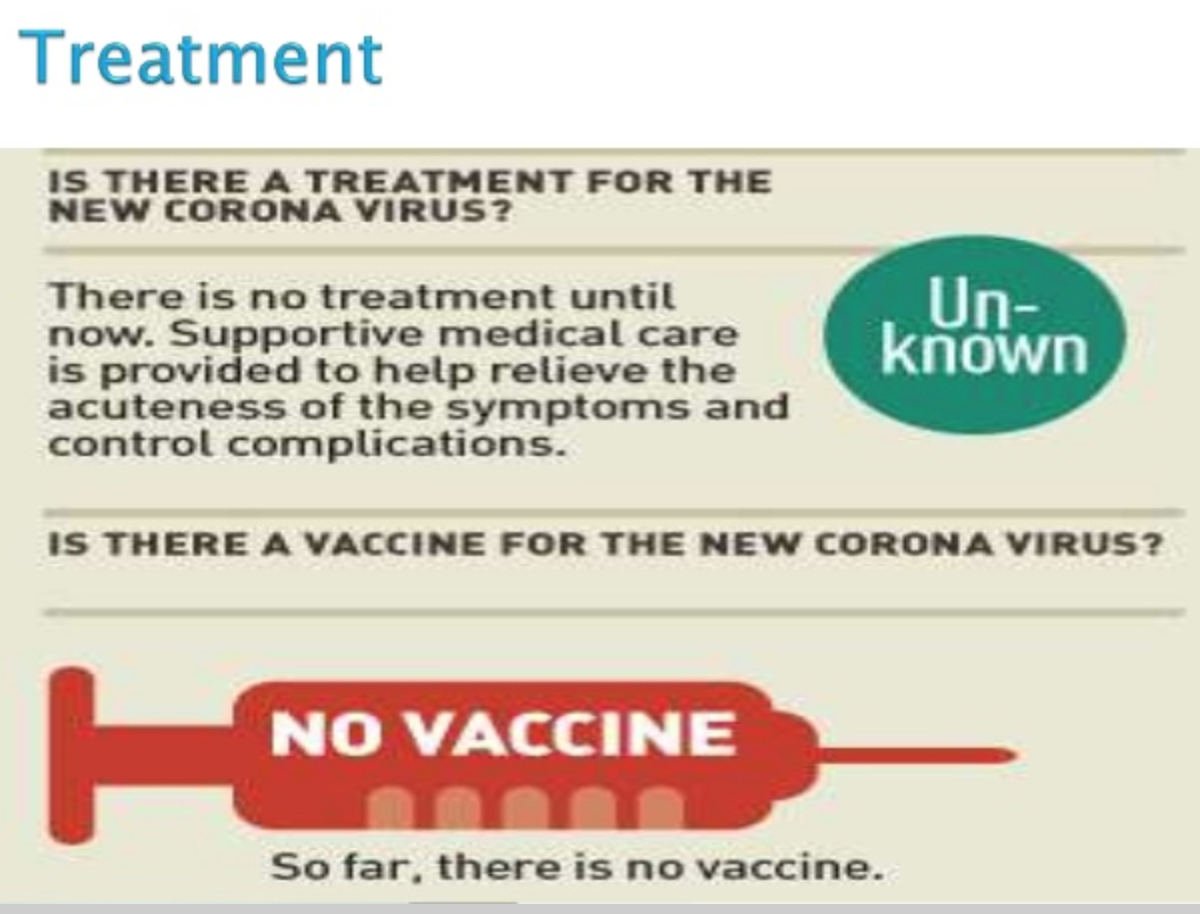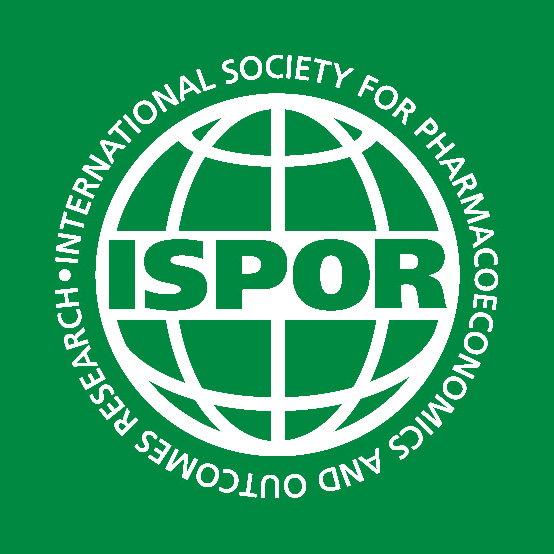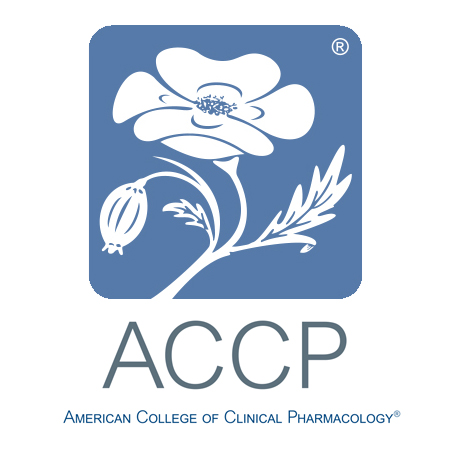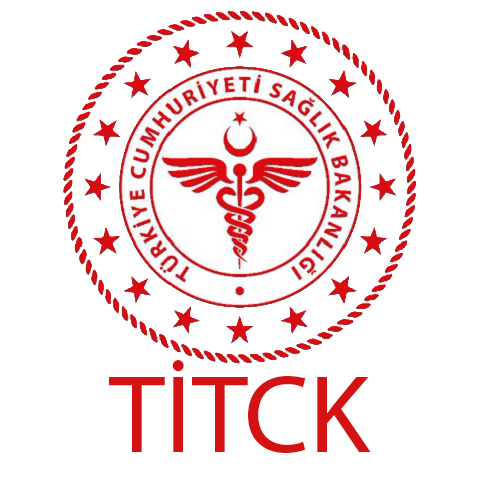
COVID-19 Tedavileri
Halen COVID-19 için FDA onaylı tedavi yoktur.
- Dünya çapında yirmiden fazla ilaç şirketi ve araştırma kuruluşu potansiyel aşıların geliştirilmesinde yer almaktadır.
- mRNA-1273 Faz 1 çalışmasında kullanıma hazır. Ulusal Alerji ve Bulaşıcı Hastalıklar Enstitüsü'ne mRNA-1273 (Moderna, Inc.) adı verilen yeni bir koronavirüs aşısı gönderildi .
- Tonix Pharmaceuticals Holding Corp., tescilli at çiçeği virüsü platformunu (horsepox virus platform ) kullanarak COVID-19'a karşı potansiyel bir aşının geliştirilmesini araştırdığını açıkladı .
- İsrail'deki araştırmacılar, insanlarda COVID-19 içi kuş koronavirüsü ‘’Bulaşıcı Bronşit Virüsüne (IBV)’’ karşı etkili bir aşıyı uyarlamak için çalışıyorlar .
- Remdesivir Çin ve ABD'deki klinik çalışmalarda remdesivir adı verilen ilaç araştırılmaktadır .
- Lopinavir ve ritonavir: HIV tedavisi için onaylanmış lopinavir / ritonavir adı verilen bir ilaç kombinasyonu Tayland'daki grip ilacı oseltamivir (Tamiflu) ile birlikte incelenmektedir . Tai kokteyli denilen bu kombinasyonla Bangkongda yaşlı bir Çinli kadının 18 Şubatta tamamen iyileştiği bildirilmişse de NEJM de (18 Mart 2020) yayınlanan makalede lopinovir+rinotavr2in Covid19 da etkisiz olduğu yayınlanmıştır
- Favipiravir 17 Şubat 2020'de Çin'de influenza tedavisi için pazarlama onayı aldığı bildirilen favipiravir adı verilen bir antiviral ilacın , yeni koronavirüs pnömonisinin tedavisi olarak klinik çalışmalarda kullanılması onaylandı.
- Fingolimod: Multipl skleroz nükslerinin tedavisi için kullanılan Fingolimod Çin'de Fujian Tıp Fakültesi Hastanesi nde COVID-19 için denenmiştir.
- Metilprednizolon : Yaygın olarak kullanılan metilprednizolon adı verilen bir glukokortikoid , Çin'in Hubei eyaletindeki bir dizi hastanede yeni koronavirüs pnömonisinin tedavisinde güvenlik ve etkinlik açısından araştırılmaktadır .
- Klorokin fosfat Eski sıtma ilacı klorokininin , koronavirüs dahil olmak üzere çok çeşitli antiviral etkilere sahip olduğu gösterilmiştir. Çin'in Guangdong Eyaletindeki çalışmalar , klorokinin yeni koronavirüs pnömonisi olan kişilerde hasta sonuçlarının iyileştirilmesine yardımcı olabileceğini düşündürmektedir.
- Hidroksiklorokin sülfat 9 Mart'taki journal Clinical Infectious Diseases de sıtma ilacı hidroksiklorokininin laboratuvar deneylerinde koronavirüsün öldürülmesinde etkili olduğu bildirilmiştir . Hidroksiklorokin ilk kez 1995 yılında Plaquenil markası altında FDA tarafından onaylandı ve ayrıca lupus ve artritli hastaların tedavisinde de kullanıldı.
- Bevasizumab adlı bir VEGF inhibitörü (bazı kanser türleri için markası Avastin altında pazarlanan) akut akciğer hasarı (ALI) ve COVID-19 pnömonisi için Jinan, Çin Shandong Üniversitesi Qilu Hastanesinde kullanılmıştır.
- Hidroksiklorokin ve azitromisin Fransız hükümeti tarafından yaptırılan küçük bir çalışmada , COVID-19'lu 20 hasta, sıtma ilacı hidroksiklorokin ve makrolid antibakteriyel ilaç azitromisinin (Zithromax) bir kombinasyonu ile tedavi edildi . Sonuçlar, kombinasyonu alan tüm hastaların tedaviden sonraki 6 gün içinde virolojik olarak iyileştiğini göstermiştir.
- Leronlimab adlı bir CCR5 antagonisti New York ta kritik COVID-19 lu küçük bir hasta sgrubunda denenmiştir ve ümitvar bulunmuştur..
Daha fazla bilgi için bkz https://www.cdc.gov/coronavirus/2019-ncov/hcp/therapeutic-options.html
Information for Clinicians on Therapeutic Options for COVID-19 Patients
There are no US Food and Drug Administration (FDA)-approved drugs specifically for the treatment of patients with COVID-19. At present clinical management includes infection prevention and control measures and supportive care, including supplementary oxygen and mechanical ventilatory support when indicated. An array of drugs approved for other indications as well as several investigational drugs are being studied in several hundred clinical trials that are underway across the globe. The purpose of this document is to provide information on two of the approved drugs (chloroquine and hydroxychloroquine) and one of the investigational agents (remdesivir) currently in use in the United States.
Remdesivir
Remdesivir is an investigational intravenous drug with broad antiviral activity that inhibits viral replication through premature termination of RNA transcription and has in-vitro activity against SARS-CoV-2 and in-vitro and in-vivo activity against related betacoronaviruses [1-3].
There are currently four options for obtaining remdesivir for treatment of hospitalized patients with COVID-19 and pneumonia in the United States:
- A National Institutes of Health (NIH)-sponsored adaptive double-blinded, placebo-controlled trial of remdesivir versus placebo in COVID-19 patients with pneumonia and hypoxia is enrolling non-pregnant persons aged 18 years and older with oxygen saturation of ≤94% on room air or requiring supplemental oxygen or mechanical ventilation (https://clinicaltrials.gov/ct2/show/NCT04280705). Exclusion criteria include alanine aminotransaminase or aspartate aminotransaminase levels >5 times the upper limit of normal, stage 4 severe chronic kidney disease or a requirement for dialysis (i.e., estimated glomerular filtration rate (eGFR) <30);
- Two phase 3 randomized open-label trials of remdesivir (5-days versus 10-days versus standard of care) are open to enrollment in persons aged 18 years and older with COVID-19, radiographic evidence of pneumonia and oxygen saturation of ≤94% on room air (severe disease https://clinicaltrials.gov/ct2/show/NCT04292899) or >94% on room air (moderate disease https://clinicaltrials.gov/ct2/show/NCT04292730). Exclusion criteria include alanine aminotransaminase or aspartate aminotransaminase levels >5 times the upper limit of normal, participation in another clinical trial of an experimental treatment for COVID-19, requirement for mechanical ventilation, or creatinine clearance <50 mL/min; and
- Finally, in areas without clinical trials, COVID-19 patients in the United States and other countries have been treated with remdesivir on an uncontrolled compassionate use basis. The manufacturer is currently transitioning the provision of emergency access to remdesivir from individual compassionate use requests to an expanded access program. The expanded access program for the United States is under rapid development. Further information is available at: https://rdvcu.gilead.com/
Hydroxychloroquine and Chloroquine
Hydroxychloroquine and chloroquine are oral prescription drugs that have been used for treatment of malaria and certain inflammatory conditions. Chloroquine has been used for malaria treatment and chemoprophylaxis, and hydroxychloroquine is used for treatment of rheumatoid arthritis, systemic lupus erythematosus and porphyria cutanea tarda. Both drugs have in-vitro activity against SARS-CoV, SARS-CoV-2, and other coronaviruses, with hydroxychloroquine having relatively higher potency against SARS-CoV-2 [1,4,5]. A study in China reported that chloroquine treatment of COVID-19 patients had clinical and virologic benefit versus a comparison group, and chloroquine was added as a recommended antiviral for treatment of COVID-19 in China [6]. Based upon limited in-vitro and anecdotal data, chloroquine or hydroxychloroquine are currently recommended for treatment of hospitalized COVID-19 patients in several countries. Both chloroquine and hydroxychloroquine have known safety profiles with the main concerns being cardiotoxicity (prolonged QT syndrome) with prolonged use in patients with hepatic or renal dysfunction and immunosuppression but have been reportedly well-tolerated in COVID-19 patients.
Due to higher in-vitro activity against SARS-CoV-2 and its wider availability in the United States compared with chloroquine, hydroxychloroquine has been administered to hospitalized COVID-19 patients on an uncontrolled basis in multiple countries, including in the United States. One small study reported that hydroxychloroquine alone or in combination with azithromycin reduced detection of SARS-CoV-2 RNA in upper respiratory tract specimens compared with a non-randomized control group but did not assess clinical benefit [7]. Hydroxychloroquine and azithromycin are associated with QT prolongation and caution is advised when considering these drugs in patients with chronic medical conditions (e.g. renal failure, hepatic disease) or who are receiving medications that might interact to cause arrythmias.
Hydroxychloroquine is currently under investigation in clinical trials for pre-exposure or post-exposure prophylaxis of SARS-CoV-2 infection, and treatment of patients with mild, moderate, and severe COVID-19. In the United States, several clinical trials of hydroxychloroquine for prophylaxis or treatment of SARS-CoV-2 infection are planned or will be enrolling soon. More information on trials can be found at: https://clinicaltrials.gov/.
There are no currently available data from Randomized Clinical Trials (RCTs) to inform clinical guidance on the use, dosing, or duration of hydroxychloroquine for prophylaxis or treatment of SARS-CoV-2 infection. Although optimal dosing and duration of hydroxychloroquine for treatment of COVID-19 are unknown, some U.S. clinicians have reported anecdotally different hydroxychloroquine dosing such as: 400mg BID on day one, then daily for 5 days; 400 mg BID on day one, then 200mg BID for 4 days; 600 mg BID on day one, then 400mg daily on days 2-5.
Other Drugs
Lopinavir-ritonavir did not show promise for treatment of hospitalized COVID-19 patients with pneumonia in a recent clinical trial in China [8]. This trial was underpowered, and lopinavir-ritonavir is under investigation in a World Health Organization study.
Several other drugs are under investigation in clinical trials or are being considered for clinical trials of prophylaxis or treatment of COVID-19 in the United States and worldwide. Information on registered clinical trials for COVID-19 in the United States is available at: https://clinicaltrials.gov/.
References
- Wang M, Cao R, Zhang L, Yang X, Liu J, Xu M, Shi Z, Hu Z, Zhong W, Xiao G. Remdesivir and chloroquine effectively inhibit the recently emerged novel coronavirus (2019-nCoV) in vitro. Cell Res. 2020 Mar;30(3):269-271.
- Sheahan TP, Sims AC, Leist SR, Schäfer A, Won J, Brown AJ, Montgomery SA, Hogg A, Babusis D, Clarke MO, Spahn JE, Bauer L, Sellers S, Porter D, Feng JY, Cihlar T, Jordan R, Denison MR, Baric RS. Comparative therapeutic efficacy of remdesivir and combination lopinavir, ritonavir, and interferon beta against MERS-CoV. Nat Commun. 2020 Jan 10;11(1):222.
- Sheahan TP, Sims AC, Graham RL, Menachery VD, Gralinski LE, Case JB, Leist SR, Pyrc K, Feng JY, Trantcheva I, Bannister R, Park Y, Babusis D, Clarke MO, Mackman RL, Spahn JE, Palmiotti CA, Siegel D, Ray AS, Cihlar T, Jordan R, Denison MR, Baric RS. Broad-spectrum antiviral GS-5734 inhibits both epidemic and zoonotic coronaviruses. Sci Transl Med. 2017 Jun 28;9(396).
- Colson P, Rolain JM, Lagier JC, Brouqui P, Raoult D. Chloroquine and hydroxychloroquine as available weapons to fight COVID-19. Int J Antimicrob Agents. 2020 Mar 4:105932. doi: 10.1016/j.ijantimicag.2020.105932. [Epub ahead of print]
- Yao X, Ye F, Zhang M, Cui C, Huang B, Niu P, Liu X, Zhao L, Dong E, Song C, Zhan S, Lu R, Li H, Tan W, Liu D. In Vitro Antiviral Activity and Projection of Optimized Dosing Design of Hydroxychloroquine for the Treatment of Severe Acute Respiratory Syndrome Coronavirus 2 (SARS-CoV-2). Clin Infect Dis. 2020 Mar 9. pii: ciaa237. doi: 10.1093/cid/ciaa237. [Epub ahead of print]
- Gao J, Tian Z, Yang X. Breakthrough: Chloroquine phosphate has shown apparent efficacy in treatment of COVID-19 associated pneumonia in clinical studies. Biosci Trends. 2020 Mar 16;14(1):72-73
- Gautret P, Lagier J, Parola P, Hoang V, Meddeb L, Mailhe M, et al. Hydroxychloroquine and azithromycin as a treatment of COVID-19: results of an open-label non-randomized clinical trial. International Journal of Antimicrobial Agents. In Press.
- Cao B, Wang Y, Wen D, Liu W, Wang J, Fan G, Ruan L, Song B, Cai Y, Wei M, Li X, Xia J, Chen N, Xiang J, Yu T, Bai T, Xie X, Zhang L, Li C, Yuan Y, Chen H, Li H, Huang H, Tu S, Gong F, Liu Y, Wei Y, Dong C, Zhou F, Gu X, Xu J, Liu Z, Zhang Y, Li H, Shang L, Wang K, Li K, Zhou X, Dong X, Qu Z, Lu S, Hu X, Ruan S, Luo S, Wu J, Peng L, Cheng F, Pan L, Zou J, Jia C, Wang J, Liu X, Wang S, Wu X, Ge Q, He J, Zhan H, Qiu F, Guo L, Huang C, Jaki T, Hayden FG, Horby PW, Zhang D, Wang C. A Trial of Lopinavir-Ritonavir in Adults Hospitalized with Severe Covid-19. N Engl J Med. 2020 Mar 18. doi: 10.1056/NEJMoa2001282. [Epub ahead of print]







